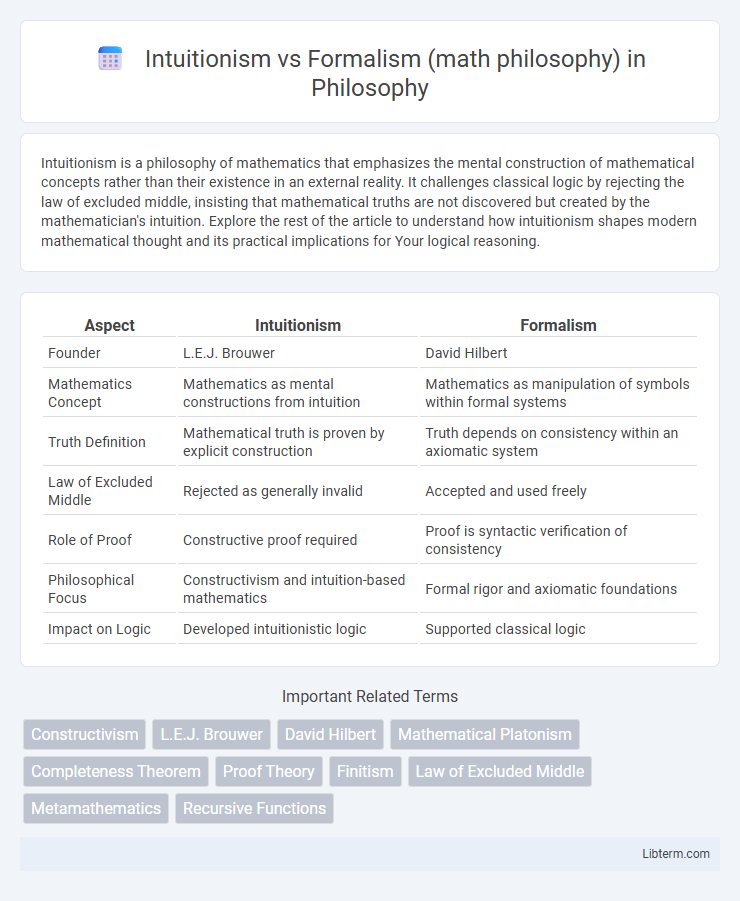Intuitionism is a philosophy of mathematics that emphasizes the mental construction of mathematical concepts rather than their existence in an external reality. It challenges classical logic by rejecting the law of excluded middle, insisting that mathematical truths are not discovered but created by the mathematician's intuition. Explore the rest of the article to understand how intuitionism shapes modern mathematical thought and its practical implications for Your logical reasoning.
Table of Comparison
| Aspect | Intuitionism | Formalism |
|---|---|---|
| Founder | L.E.J. Brouwer | David Hilbert |
| Mathematics Concept | Mathematics as mental constructions from intuition | Mathematics as manipulation of symbols within formal systems |
| Truth Definition | Mathematical truth is proven by explicit construction | Truth depends on consistency within an axiomatic system |
| Law of Excluded Middle | Rejected as generally invalid | Accepted and used freely |
| Role of Proof | Constructive proof required | Proof is syntactic verification of consistency |
| Philosophical Focus | Constructivism and intuition-based mathematics | Formal rigor and axiomatic foundations |
| Impact on Logic | Developed intuitionistic logic | Supported classical logic |
Introduction to Mathematical Philosophy
Intuitionism, founded by L.E.J. Brouwer, emphasizes mathematics as a mental construction grounded in intuitive understanding, rejecting classical logic's law of excluded middle. Formalism, advocated by David Hilbert, treats mathematics as manipulation of symbols within formal systems, aiming for consistency and completeness through axiomatic proofs. Introduction to Mathematical Philosophy by Bertrand Russell contrasts these views by analyzing the foundations and logical principles underlying mathematical discourse.
Defining Intuitionism in Mathematics
Intuitionism in mathematics asserts that mathematical objects are mental constructions rather than independent entities, relying on constructive proofs that explicitly build mathematical objects. It rejects the law of excluded middle, emphasizing that truth is tied to our ability to construct a proof rather than abstract logical principles. This philosophy, pioneered by L.E.J. Brouwer, challenges classical logic by prioritizing mathematical intuition and constructive methods over formal axiomatic systems.
Understanding Formalism in Mathematics
Formalism in mathematics emphasizes the manipulation of symbols and formal systems without requiring inherent meaning, focusing on consistency and rule-based derivations within axiomatic frameworks. It treats mathematical statements as strings of symbols governed by explicit syntactic rules, prioritizing the development of rigorous proofs and avoidance of contradictions. This philosophy contrasts with intuitionism by rejecting the necessity of mathematical objects existing independently of formal manipulation.
Historical Roots of Intuitionism and Formalism
Intuitionism, founded by L.E.J. Brouwer in the early 20th century, emerged as a reaction against the classical logic and set theory prevalent in mathematics, emphasizing mathematics as a mental construction rooted in human intuition. Formalism, championed by David Hilbert, originated around the same period, advocating for mathematics as a system of formal symbols manipulated according to fixed rules, independent of any inherent meaning. The historical development of these philosophies reflects a fundamental debate over the nature of mathematical truth and the foundations of mathematics during the foundational crises of the early 1900s.
Core Principles of Intuitionism
Intuitionism in mathematics asserts that mathematical truths are constructions of the human mind rather than discoveries of an external reality, emphasizing mental constructions and constructive proof methods. Core principles include the rejection of the law of excluded middle for infinite sets, the insistence that existence must be demonstrated through explicit construction, and the view that mathematical statements are only true if they can be intuitively constructed. Intuitionism contrasts with Formalism by denying that mathematics is merely a manipulation of symbols according to formal rules without inherent meaning.
Key Tenets of Formalism
Formalism in mathematical philosophy asserts that mathematics is fundamentally a manipulation of symbols according to specified rules, without any inherent meaning attached to the symbols themselves. It emphasizes consistency and rigor through formal systems, aiming to establish mathematics as a complete and self-contained structure free from ambiguity. Formalists prioritize the syntactic aspects of mathematics, seeking to prove theorems solely based on axioms and inference rules, thereby avoiding reliance on intuition or semantic interpretation.
Differences Between Intuitionism and Formalism
Intuitionism in mathematics emphasizes the constructive nature of mathematical objects, insisting that mathematical truths are known through mental constructions rather than abstract symbols. Formalism, by contrast, views mathematics as manipulation of formal symbols based on axioms without regard to inherent meaning or mental intuition. The key difference lies in Intuitionism's rejection of the law of excluded middle and classical logic, whereas Formalism accepts classical logic and treats mathematics as a game of symbol manipulation within a formal system.
Major Figures in Intuitionism and Formalism
L.E.J. Brouwer stands as the pivotal figure in Intuitionism, advocating for mathematics grounded in mental constructions rather than abstract formal systems, emphasizing constructive proofs and rejecting the law of excluded middle. David Hilbert championed Formalism, promoting the idea that mathematics is a manipulation of symbols according to fixed rules, aiming to establish consistency and completeness of mathematical theories through formal proof systems. Other notable contributors include Arend Heyting, who formalized Intuitionistic logic, and Paul Bernays, who worked closely with Hilbert on formalist foundations.
Impact on Modern Mathematical Practice
Intuitionism's emphasis on constructive proof methods reshaped algorithmic approaches in computer science and constructive mathematics, fostering software verification and reliable computation. Formalism's axiomatic frameworks standardized mathematical rigor, enabling the development of automated theorem proving and influencing the design of formal systems like ZFC set theory. The interplay between intuitionism and formalism drives ongoing research in proof theory, type theory, and the foundations of mathematics, impacting both theoretical advances and practical applications.
Contemporary Debates and Future Directions
Contemporary debates between Intuitionism and Formalism revolve around the nature of mathematical truth, with Intuitionism emphasizing constructive proof and mental constructions, while Formalism treats mathematics as manipulation of symbols within formal systems. Recent discussions highlight the impact of computational methods and type theory, bridging gaps by integrating constructive approaches into formal frameworks. Future directions include exploring homotopy type theory and categorical logic as unifying foundations that reconcile intuitionistic principles with formalist rigor.
Intuitionism Infographic

 libterm.com
libterm.com